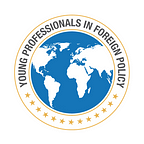YPFP Book Club: “Bitter Fruit”
By Miranda Tomic
At the height of the Cold War, the tiny Central American nation of Guatemala dared to challenge the role of unbridled international capitalism within its borders. In doing so, Guatemala stoked the ire of the United States and triggered a reaction that demonstrated the full range of U.S. military and diplomatic power.
“Bitter Fruit” is a riveting account of the U.S.-backed 1954 coup in Guatemala, following the forces and characters involved in the events, the machinations which set the stage, and the consequences years later. Authors Stephen Schlesinger and Stephen Kinzer paint a vivid picture of Guatemala, a banana republic attempting democratic and economic reform for the first time in its history. These reforms challenged the vested interests of the United Fruit Company (UFCo) and the U.S. government. The authors detail the ensuing conflict, analyzing how the strategic application of soft-power tactics were deployed to overthrow a democratic government.
From its independence, Guatemala was a country accustomed to authoritarian rule and foreign influence, and the United Fruit Company (UFCo) was a prime player in this saga. Drawn by cheap land and equally cheap labor, the company grew under decades of favorable conditions provided by successive regimes. This unhindered growth and influence was jolted with the 1944 Guatemalan Revolution. UFCo cautiously continued operations in the subsequent years, until the 1952 Agrarian Reform Act. The Act challenged UFCo’s operations in Guatemala by expropriating uncultivated portions of their plantations. In response, UFCo set upon a massive public relations and lobbying effort which ultimately influenced public opinion in the U.S. and the U.S. government’s response.
UFCo representatives crafted a narrative of communist takeover in Guatemala, framing their organization as an innocuous victim. The campaign had tremendous reach throughout American society, targeting influencers in government, journalism, and academia, affecting every corner of public discourse. Schlesinger and Kinzer cite UFCo’s campaign as the primary factor triggering U.S. intervention in Guatemala. Indeed, UFCo’s influence is impossible to discount. Their campaign was layered and strategic, demonstrating the influence of soft power in international politics. By directing the national conversation and molding the opinions of decision makers, UFCo was able to steer U.S. power brokers and elicit government actions that favored its corporate interests.
What the authors discount, however, is another center of soft power which influenced government actors at this time: Cold War attitudes. Fear of communist influence in the Western Hemisphere arguably shaped all U.S. decisions and actions throughout the 1950s and beyond. In fact, the official U.S. explanation for its resistance to the Guatemalan actions was this very fear. The authors would have done well to further analyze how deeply these concerns permeated decision makers. This fear was likely the true underlying force motivating U.S. intervention, with UFCo’s campaign simply reinforcing pre-existing conclusions. Nonetheless, this again demonstrates the centrality of soft power in international actions. With Cold War attitudes setting the stage, UFCo’s campaign stoked further fear of communist influence, propelling a long chain of nuanced attitudes and small, but strategic actions that fueled the U.S.-backed military coup.
Schlesinger and Kinzer lay out a thoroughly documented account of the American-backed coup to overthrow Guatemalan President Arbenz. The publication and contextualization of these activities, sourced mostly through the Freedom of Information Act, is the signature achievement of “Bitter Fruit.”
The coup took place in June 1954 and was designed to look like an organic, internal rebellion. “Operation Success” was initiated with a campaign of psychological warfare that persisted through the duration of the coup. Leaflets were dropped in the capital in the days leading up to military attacks; the Voice of Liberation radio station was covertly established to spread propaganda; disinformation campaigns were sewn through various diplomatic channels. According to the authors’ analysis, the coup’s success could be attributed primarily to this psychological campaign, as opposed to the orchestrated guerilla attack.
The story of the 1954 coup gives rise to broad questions about the sources of power and influence in international relations. The book makes a strong case for a constructivist interpretation of events. The successful overthrow of a democratically elected president was primarily due to the application of soft power in a highly strategic manner. Public discourse, diplomacy, and propaganda were deployed more effectively than the small group of CIA-backed rebel forces.
It seems a fitting moment in U.S. history to consider how deeply geopolitical attitudes and private sector lobbying could influence American society. Though today’s climate is vastly different from the Cold War context, the lessons of strategic influence are still highly relevant. Where are the private interest power structures located today? How do they coincide, or conflict, with public attitudes and apprehensions? How are we — whether decision makers or members of the broader electorate — influenced by different aspects of our national discourse? What private interests exist today, in place of United Fruit, and how might the U.S. be susceptible to a nudge — or perhaps a shove — by those interests?
Miranda works in marketing and communications for MSA Security, a New York based firm specializing in explosive detection services and high consequence threat protection. Miranda has an M.A. International Affairs with a concentration in governance and rights from The New School University and a B.A. in Liberal Arts from St. John’s College.
The opinions expressed in this article are the author’s own and do not reflect the views of their employer of Young Professionals in Foreign Policy (YPFP) New York.
YPFP engages, builds, and amplifies NexGen voices to advance innovative solutions to global challenges. Interested in membership? Learn more.
